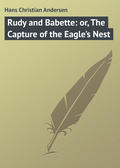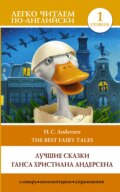
Ганс Христиан Андерсен
The Sand-Hills of Jutland
Something
"I will be something," said the oldest of five brothers. "I will be of use in the world, let the position be ever so insignificant which I may fill. If it be only respectable, it will be something. I will make bricks – people can't do without these – and then I shall have done something."
"But something too trifling," said the second brother. "What you propose to do is much the same as doing nothing; it is no better than a hodman's work, and can be done by machinery. You had much better become a mason. That is something, and that is what I will be. Yes, that is a good trade. A mason can get into a trade's corporation, become a burgher, have his own colours and his own club. Indeed, if I prosper, I may have workmen under me, and be called 'Master,' and my wife 'Mistress;' and that would be something."
"That is next to nothing," said the third. "There are many classes in a town, and that is about the lowest. It is nothing to be called 'Master.' You might be very superior yourself; but as a master mason you would be only what is called 'a common man.' I know of something better. I will be an architect; enter upon the confines of science; work myself up to a high place in the kingdom of mind. I know I must begin at the foot of the ladder. I can hardly bear to say it – I must begin as a carpenter's apprentice, and wear a cap, though I have been accustomed to go about in a silk hat. I must run to fetch beer and spirits for the common workmen, and let them be 'hail fellow well met' with me. This will be disagreeable; but I will fancy that it is all a masquerade and the freedom of maskers. To-morrow – that is to say, when I am a journeyman – I will go my own way. The others will not join me. I shall go to the academy, and learn to draw and design; then I shall be called an architect. That is something! That is much! I may become 'honourable,' or even 'noble' – perhaps both. I shall build and build, as others have done before me. There is something to look forward to – something worth being!"
"But that something I should not care about," said the fourth. "I will not march in the wake of anybody. I will not be a copyist; I will be a genius – will be cleverer than you all put together. I shall create a new style, furnish ideas for a building adapted to the climate and materials of the country – something which shall be a nationality, a development of the resources of our age, and, at the same time, an exhibition of my own genius."
"But if by chance the climate and the materials did not suit each other," said the fifth, "that would be unfortunate for the result. Nationalities may be so amplified as to become affectation. The discoveries of the age, like youth, may leave you far behind. I perceive right well that none of you will, in reality, become anything, whatever may be your expectations. But do all of you what you please; I shall not follow your examples. I shall keep myself disengaged, and shall reason upon what you perform. There is something wrong in everything. I will pick that out, and reason upon it. That will be something."
And so he did; and people said of the fifth, "He has not settled to anything. He has a good head, but he does nothing."
Even this, however, made him something.
This is but a short history; yet it is one which will not end as long as the world stands.
But is there nothing more about the five brothers? What has been told is absolutely nothing. Hear further; it is quite a romance.
The eldest brother, who made bricks, perceived that from every stone, when it was finished, rolled a small coin; and though these little coins were but of copper, many of them heaped together became a silver dollar; and when one knocks with such at the baker's, the butcher's, and other shops, the doors fly open, and one gets what one wants. The bricks produced all this. The damaged and broken bricks were also made good use of.
Yonder, above the embankment, Mother Margrethe, a poor old woman, wanted to build a small house for herself. She got all the broken bricks, and some whole ones to boot; for the eldest brother had a good heart. The poor woman built her house herself. It was very small; the only window was put in awry, the door was very low, and the thatched roof might have been laid better; but it was at least a shelter and a cover for her. There was a fine view from it of the sea, which broke in its might against the embankment. The salt spray often dashed over the whole tiny house, which still stood there when he was dead and gone who had given the bricks: —
The second brother could build in another way. He was also clever in his business. When his apprenticeship was over he strapped on his knapsack, and sang the mechanic's song: —
"While young, far-distant lands I'll tread.
Away from home to build,
My handiwork shall win my bread,
My heart with hope be filled.
And when my fatherland I see,
And meet my bride – hurra!
An active workman I shall be:
Then who so happy and gay?"
And he was that. When he returned to his native town, and became a master, he built house after house – a whole street. It was a very handsome one, and a great ornament to the town. These houses built for him a small house, which was to be his own. But how could the houses build? Ay, ask them that, and they will not answer you; but people will answer for them, and tell you, "It certainly was that street which built him a house." It was only a small one, to be sure, and with a clay floor; but when he and his bride danced on it the floor became polished and bright, and from every stone in the wall sprang a flower which was quite as good as any costly tapestry. It was a pleasant house, and they were a happy couple. The colours of the masons' company floated outside, and the journeymen and apprentices shouted "Hurra!" Yes, that was something; and so he died – and that was also something.
Then came the architect, the third brother, who had been first a carpenter's apprentice, wearing a cap and going on errands; but, on leaving the academy, rose to be an architect, and he became a man of consequence. Yes, if the houses in the street built by his brother, the master mason, had provided him with a house, a street was called after the architect, and the handsomest house in it was his own. That was something; and he was somebody, with a long, high-sounding title besides. His children were called people of quality, and when he died his widow was a widow of rank – that was something. And his name stood as a fixture at the corner of the street, and was often in folks' mouths, being the name of a street – and that was certainly something.
Next came the genius – the fourth brother – who was to devote himself to new inventions. In one of his ambitious attempts he fell, and broke his neck; but he had a splendid funeral, with a procession, and flags, and music. He was noticed in the newspapers, and three funeral orations were pronounced over him, the one longer than the others; and much delighted he would have been with them if he had heard them, for he was fond of being talked about. A monument was erected over his grave. It was not very grand, but a monument is always something.
He now was dead, as well as the three other brothers; but the fifth – he who was fond of reasoning or arguing – out-lived them all; and that was quite right, for he had thus the last word. And he thought it a matter of great importance to have the last word. It was he who, folks said, "had a good head." At length his last hour also struck. He died, and he arrived at the gate of the kingdom of heaven. Spirits always come there two and two, and along with him stood there another soul, which wanted also to get in, and this was no other than the old Mother Margrethe, from the house on the embankment.
"It must surely be for the sake of contrast that I and yon paltry soul should come here at the same moment," said the reasoner. "Why, who are you, old one? Do you also expect to enter here?" he asked.
And the old woman courtesied as well as she could. She thought it was St. Peter himself who spoke.
"I am a miserable old creature without any family. My name is Margrethe."
"Well, now, what have you done and effected down yonder?"
"I have effected scarcely anything in yonder world – nothing that can tell in my favour here. It will be a pure act of mercy if I am permitted to enter this gate."
"How did you leave yon world?" he asked, merely for something to say. He was tired of standing waiting there.
"Oh! how I left it I really do not know. I had been very poorly, often quite ill, for some years past, and I was not able latterly to leave my bed, and go out into the cold and frost. It was a very severe winter; but I was getting through it. For a couple of days there was a dead calm; but it was bitterly cold, as your honour may remember. The ice had remained so long on the ground, that the sea was frozen over as far as the eye could reach. The townspeople flocked in crowds to the ice. I could hear it all as I lay in my poor room. The same scene continued till late in the evening – till the moon rose. From my bed I could see through the window far out beyond the seashore; and there lay on the horizon, just where the sea and sky seemed to meet, a singular-looking white cloud. I lay and looked at it; looked at the black spot in the middle of it, which became larger and larger; and I knew what that betokened, for I was old and experienced, though I had not often seen that sign. I saw it and shuddered. Twice before in my life had I seen that strange appearance in the sky, and I knew that there would be a terrible storm at the springtide, which would burst over the poor people out upon the ice, who were now drinking and rushing about, and amusing themselves. Young and old – the whole town in fact – were assembled yonder. Who was to warn them of coming danger, if none of them observed or knew what I now perceived? I became so alarmed, so anxious, that I got out of my bed, and crawled to the window. I was incapable of going further; but I put up the window, and, on looking out, I could see the people skating and sliding and running on the ice. I could see the gay flags, and could hear the boys shouting hurra, and the girls and the young men singing in chorus. All was jollity and merriment there. But higher and higher arose the white cloud with the black spot in it. I cried out as loud as I could, but nobody heard me. I was too far away from them. The wind would soon break loose, the ice give away, and all upon it sink, without any chance of rescue. Hear me they could not, and for me to go to them was impossible. Was there nothing that I could do to bring them back to land? Then our Lord inspired me with the idea of setting fire to my bed; it would be better that my house were to be burned down than that the many should meet with such a miserable death. Then I kindled the fire. I saw the red flames, and I gained the outside of the house; but I remained lying there. I could do no more, for my strength was exhausted. The blaze pursued me – it burst from the window, and out upon the roof. The crowds on the ice perceived it, and they came running as fast as they could to help me, a poor wretch, whom they thought would be burned in my bed. It was not one or two only who came – they all came. I heard them coming; but I also heard all at once the shrill whistle, the loud roar of the wind. I heard it thunder like the report of a cannon. The springtide lifted the ice, and suddenly it broke asunder; but the crowd had reached the embankment, where the sparks were flying over me. I had been the means of saving them all; but I was not able to survive the cold and fright, and so I have come up here to the gate of the kingdom of heaven; but I am told it is locked against such poor creatures as I. And now I have no longer a home down yonder on the embankment, though that does not insure me any admittance here."
At that moment the gate of heaven was opened, and an angel took the old woman in. She dropped a straw; it was one of the pieces of straw which had stuffed the bed to which she had set fire to save the lives of many, and it had turned to pure gold, but gold that was flexible, and twisted itself into pretty shapes.
"See! the poor old woman brought this," said the angel. "What dost thou bring? Ah! I know well; thou hast done nothing – not even so much as making a brick. If thou couldst go back again, and bring only so much as that, if done with good intentions, it would be something: as thou wouldst do it, however, it would be of no avail. But thou canst not go back, and I can do nothing for thee."
Then the poor soul, the old woman from the house on the embankment, begged for him.
"His brother kindly gave me all the stones with which I built my humble dwelling. They were a great gift to a poor creature like me. May not all these stones and fragments be permitted to value as one brick for him? It was a deed of mercy. He is now in want, and this is Mercy's home."
"Thy brother whom thou didst think the most inferior to thyself – him whose honest business thou didst despise – shares with thee his heavenly portion. Thou shalt not be ordered away; thou shalt have leave to remain outside here to think over and to repent thy life down yonder; but within this gate thou shalt not enter until in good works thou hast performed something."
"I could have expressed that sentence better," thought the conceited logician; but he did not say this aloud, and that was surely already – something.
The Old Oak Tree's Last Dream
A CHRISTMAS TALE
There stood in a wood, high up on the side of a sloping hill near the open shore, a very old oak tree. It was about three hundred and sixty-five years old, but those long years were not more than as many single rotations of the earth for us men. We are awake during the day, and sleep during the night, and have then our dreams: with the tree it is otherwise. A tree is awake for three quarters of a year. It only sleeps in winter – that is its night – after the long day which is called spring, summer, and autumn.
Many a warm summer day had the ephemeron insect frolicked round the oak tree's head – lived, moved about, and found itself happy; and when the little creature reposed for a moment in calm enjoyment on one of the great fresh oak leaves, the tree always said, —
"Poor little thing! one day alone is the span of thy whole life. Ah, how short! It is very sad."
"Sad!" the ephemeron always replied. "What dost thou mean by that? Everything is so charming, so warm and delightful, that I am quite happy."
"But for only one day; then all is over."
"All is over!" exclaimed the insect. "What is the meaning of 'all is over?' Is all over with thee also?"
"No; I may live, perhaps, thousands of thy days, and my lifetime is for centuries. It is so long a period that thou couldst not calculate it."
"No, for I do not understand thee. Thou hast thousands of my days, but I have thousands of moments to be happy in. Is all the beauty in the world at an end when thou diest?"
"Oh! by no means," replied the tree. "It will last longer – much, much longer than I can conceive."
"Well, I think we are much on a par, only that we reckon differently."
And the ephemeron danced and floated about in the sunshine, and enjoyed itself with its pretty little delicate wings, like the most minute flower – enjoyed itself in the warm air, which was so fragrant with the sweet perfumes of the clover-fields, of the wild roses in the hedges, and of the elder-flower, not to speak of the woodbine, the primrose, and the wild mint. The scent was so strong that the ephemeron was almost intoxicated by it. The day was long and pleasant, full of gladness and sweet perceptions; and when the sun set, the little insect felt a sort of pleasing languor creeping over it after all its enjoyments. Its wings would no longer carry it, and very gently it glided down upon the soft blade of grass that was slightly waving in the evening breeze; there it drooped its tiny head, and fell into a calm sleep – the sleep of death.
"Poor little insect!" exclaimed the oak tree, "thy life was far too short."
And every summer's day were repeated a similar dance, a similar conversation, and a similar death. This went on with the whole generation of ephemera, and all were equally happy, equally gay. The oak tree remained awake during its spring morning, its summer day, and its autumn evening; now it was near its sleeping time, its night – the winter was close at hand.
Already the tempests were singing, "Good night, good night! Thy leaves are falling – we pluck them, we pluck them! Try if thou canst slumber; we shall sing thee to sleep, we shall rock thee to sleep; and thy old boughs like this – they are creaking in their joy! Softly, softly sleep! It is thy three hundred and sixty-fifth night. Sleep calmly! The snow is falling from the heavy clouds; it will soon be a wide sheet, a warm coverlet for thy feet. Sleep calmly and dream pleasantly!"
And the oak tree stood disrobed of all its leaves to go to rest for the whole long winter, and during that time to dream many dreams, often something stirring and exciting, like the dreams of human beings.
It, too, had once been little. Yes, an acorn had been its cradle. According to man's reckoning of time it was now living in its fourth century. It was the strongest and loftiest tree in the wood, with its venerable head reared high above all the other trees; and it was seen far away at sea, and looked upon as a beacon by the navigators of the passing ships. It little thought how many eyes looked out for it. High up amidst its green coronal the wood-pigeons built their nests, and the cuckoo's note was heard from thence; and in the autumn, when the leaves looked like hammered plates of copper, came birds of passage, and rested there before they flew far over the sea. But now it was winter, and the tree stood leafless, and the bended and gnarled branches were naked. Crows and jackdaws came and sat themselves there alternately, and talked of the rigorous weather which was commencing, and how difficult it was to find food in winter.
It was just at the holy Christmas time that the tree dreamt its most charming dream. Let us listen to it.
The tree had a distinct idea that it was a period of some solemn festival; it thought it heard all the church bells round ringing, and it seemed to be a mild summer day. Its lofty head, it fancied, looked fresh and green, while the bright rays of the sun played among its thick foliage. The air was laden with the perfume of wild flowers; various butterflies chased each other in sport around its boughs, and the ephemera danced and amused themselves. All that during years the tree had known and seen around it now passed before it as in a festive procession. It beheld, as in the olden time, knights and ladies on horseback, with feathers in their hats and falcons on their hands, riding through the greenwood; it heard the horns of the huntsmen, and the baying of the hounds; it saw the enemies' troops, with their various uniforms, their polished armour, their lances and halberds, pitch their tents and take them down again; the watch-fires blazed, and the soldiers sang and slept under the sheltering branches of the tree. It beheld lovers meet in the soft moonlight, and cut their names – that first letter – upon its olive-green bark. Guitars and Æolian harps were again – but there were very many years between them – hung up on the boughs of the tree by gay travelling swains, and again their sweet sounds broke on the stillness around. The wood-pigeons cooed, as if they were describing the feelings of the tree, and the cuckoo told how many summer days it should yet live.
Then it was as if a new current of life rushed from its lowest roots up to its highest branches, even to the farthest leaves; the tree felt that it extended itself therewith, yet it perceived that its roots down in the ground were also full of life and warmth; it felt its strength increasing, and that it was growing taller and taller. The trunk shot up – there was no pause – more and more it grew – its head became fuller, broader – and as the tree grew it became happier, and its desire increased to rise up still higher, even until it could reach the warm, blazing sun.
Already had it mounted above the clouds, which, like multitudes of dark migratory birds, or flocks of white swans, were floating under it; and every leaf of the tree that had eyes could see. The stars became visible during the day, and looked so large and bright: each of them shone like a pair of mild, clear eyes. They might have recalled to memory dear, well-known eyes – the eyes of children – the eyes of lovers when they met beneath the tree.
It was a moment of exquisite delight. Yet in the midst of its pleasure it felt a desire, a longing that all the other trees in the wood beneath – all the bushes, plants, and flowers – might be able to lift themselves like it, and to participate in its joyful and triumphant feelings. The mighty oak tree, in the midst of its glorious dream, could not be entirely happy unless it had all its old friends with it, great and small; and this feeling pervaded every branch and leaf of the tree as strongly as if it had lived in the breast of a human being.
The summit of the tree moved about as if it missed and sought something left behind. Then it perceived the scent of the woodbine, and soon the still stronger scent of the violets and wild thyme; and it fancied it could hear the cuckoo repeat its note.
At length amidst the clouds peeped forth the tops of the green trees of the wood; they also grew higher and higher, as the oak had done; the bushes and the flowers shot up high in the air; and some of these, dragging their slender roots after them, flew up more rapidly. The birch was the swiftest among the trees: like a white flash of lightning it darted its slender stem upwards, its branches waving like green wreaths and flags. The wood and all its leafy contents, even the brown-feathered rushes, grew, and the birds followed them singing; and in the fluttering blades of silken grass the grasshopper sat and played with his wings against his long thin legs, and the wild bees hummed, and all was song and gladness as up in heaven.
"But the blue-bell and the little wild tansy," said the oak tree; "I should like them with me too."
"We are with you," they sang in their low, sweet tones.
"But the pretty water-lily of last year, and the wild apple tree that stood down yonder, and looked so fresh, and all the forest flowers of years past, had they lived and bloomed till now, they might have been with me."
"We are with you – we are with you," sang their voices far above, as if they had gone up before.
"Well, this is quite enchanting," cried the old tree. "I have them all, small and great – not one is forgotten. How is all this happiness possible and conceivable?"
"In the celestial paradise all this is possible and conceivable," voices chanted around.
And the tree, which continued to rise, observed that its roots were loosening from their hold in the earth.
"This is well," said the tree. "Nothing now retains me. I am free to mount to the highest heaven – to splendour and light; and all that are dear to me are with me – small and great – all with me."
"All!"
This was the oak tree's dream; and whilst it dreamt a fearful storm had burst over sea and land that holy Christmas eve. The ocean rolled heavy billows on the beach – the tree rocked violently, and was torn up by the roots at the moment it was dreaming that its roots were loosening. It fell. Its three hundred and sixty-five years were now as but the day of the ephemeron.
On Christmas morning, when the sun arose, the storm was passed. All the church bells were ringing joyously; and from every chimney, even the lowest in the peasant's cot, curled from the altars of the Druidical feast the blue smoke of the thanksgiving oblation. The sea became more and more calm, and on a large vessel in the offing, which had weathered the tempest during the night, were hoisted all its flags in honour of the day.
"The tree is gone – that old oak tree which was always our landmark!" cried the sailors. "It must have fallen in the storm last night. Who shall replace it? Alas! no one can."
This was the tree's funeral oration – short, but well meant – as it lay stretched at full length amidst the snow upon the shore, and over it floated the melody of the psalm tunes from the ship – hymns of Christmas joy, and thanksgivings for the salvation of the souls of mankind by Jesus Christ, and the blessed promise of everlasting life.
"Let sacred songs arise on high,
Loud hallelujahs reach the sky;
Let joy and peace each mortal share,
While hymns of praise shall fill the air."
Thus ran the old psalm, and every one out yonder, on the deck of the ship, lifted up his voice in thanksgiving and prayer, just as the old oak tree was lifted up in its last and most delightful dream on that Christmas eve.






